This is an automatically translated article.
Posted by Doctor, Doctor Ho Thu Mai - Head of Nutrition Department - Department of Medical Examination - Vinmec Times City International General Hospital
The body needs energy to regenerate body tissues, maintain body temperature, grow and for other activities. Food and nutrition can help the body increase energy efficiency. Accordingly, each person needs to know how to balance energy to ensure nutrition, protect the body and long-term health.
1. Energy balance
A complete understanding of the body's weight regulation mechanisms remains a challenge for nutritionists today. The maintenance of body weight is a complex regulatory coordination including intake, basal metabolism and energy expenditure. Any deviation in this regulation system leads to undernutrition disorder, overnutrition or other diseases.
Energy balance is expressed in the following formula: Energy intake = Energy expended + energy stored.
If the total amount of energy stored in the body (such as fat, protein, glycogen) remains unchanged, the energy stored will be zero. In that case, the energy expended is equal to the energy ingested and then the muscle Our bodies are in a state of energy balance. If the energy intake is not balanced with the energy expended, then there will be a change in the composition of the energy contained in the body. If the energy balance is negative, the energy stored in the body will be used (fat, protein, glycogen), and if the balance is positive, the body will increase the accumulation of stored energy, first increasing stored fat mass.
MORE: How much energy does 1 gram of fat provide?
2. What is the role of energy?
The body needs energy to regenerate body tissues, maintain body temperature, grow and for other activities. Food is a source of energy. Accordingly, proteins, lipids and carbohydrates in food are energy-producing substances. The unit for calculating energy is the kilocalorie (Kcal). This is the energy required to heat 1 liter of water by 1°C. One kilocalorie is equivalent to 4,184 Kilojoules, 1 gram of protein provides 4 Kcal, 1 gram of glucide provides 4 Kcal and 1 gram of lipid provides 9 Kcal.
MORE: What is Energy Density?

Bổ sung các thực phẩm giàu năng lượng sẽ giúp các hoạt động của cơ thể diễn ra tốt
3. Energy needs of the body
Energy expenditure includes for the following 3 main components:
Energy expended for basal metabolism: This is the most energy expended in all individuals, accounting for about 60-75% of energy expenditure daily. CHCB is the energy expended by the body in resting, undigested, non-muscular, and non-thermal conditions. It is the amount of heat needed to maintain the vital functions of the body thanks to: circulation, respiration, excretion, and maintenance of body temperature. Energy expenditure for physical activity: Energy expenditure for physical activity depends on the type and level of physical activity as well as the time for each activity. Energy expended in response to external stimuli such as food, cold, stress, and drugs: After eating, food has the effect of increasing the body's metabolism and energy requirements for exercise. digestion, absorption, and transport of nutrients to cells. The required energy associated with food intake ranges from 5% to 10% of basal energy requirements. Energy plays an important role in human life activities. Accordingly, we need to provide daily energy for the body, and at the same time balance the energy ingested, consumed energy and stored energy to keep the body healthy, increase resistance, protect health. long-term health.
Please dial HOTLINE for more information or register for an appointment HERE. Download MyVinmec app to make appointments faster and to manage your bookings easily.













